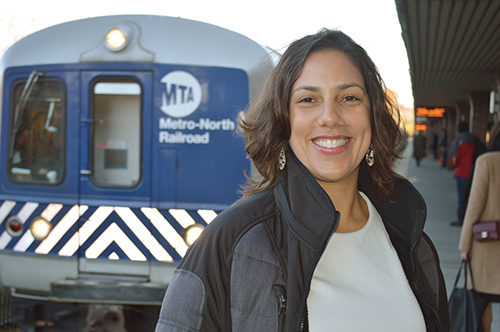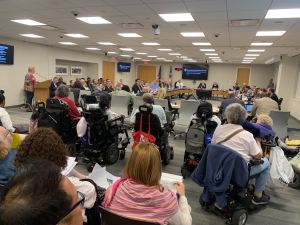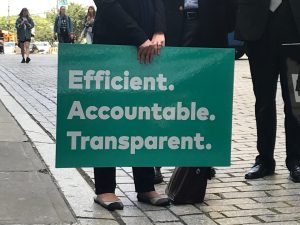Vanterpool: Trump Can’t Take Away Our Ability to Make Transit Better

In less than two months, Donald Trump will be sworn in as president, and he’ll be working with a GOP majority in Congress that is highly antagonistic to transit funding, climate sustainability efforts, and other policies that benefit walkable urban places. It’s a scary scenario for transit riders.
But if you want better transit, now is not the time to get discouraged. At a Riders Alliance panel in Soho last night, Tri-State Transportation Campaign Executive Director Veronica Vanterpool delivered a message to transit advocates — all politics is local, and city residents still have the power to win important transit victories:
Where I see a positivity is in us, and it’s in the energy in this room, and the energy in cities that we see across this country. The outlook is glum, and it’s grim. But we need to focus and remember that a lot of the wins and a lot of success has happened at the local level and at the state level. And not just in transportation — think about, you know, paid sick leave. Those were local fights, when the federal government wasn’t making these changes. There’s a lot of innovation that has happened in the cities. We cannot let that die. We need to wrap that up. We need to empower local and state advocacy, and make sure that our state government and our state elected officials, and our local government and our local elected officials, are representing what we want.
Keep going for those easy wins, because that is how we inform our elected officials…You know, all politics is local. Even at the federal level. They want to look to their district for examples. They want to look to their states and their counties for examples. Let’s give them the right examples to run with, to heed, to model. So they’re looking to us. Let’s show them. Let’s give them the message that we want them to deliver.
Vanterpool said advocates also need to refine their messages in a way that effectively communicates to rural and suburban communities the value of investment in transit.
One thing I spent a good deal of time thinking about post-election was how we need to retool our messaging, how we need to retool our messages, and what are the different constituencies that we may have neglected in our overall advocacy, and how do we bring them into the discussion. So, for example, Tri-State Transportation Campaign, our organization, represents the Tri-State region, and we work in the suburbs as well.
Many of those residents don’t use public transportation, so it’s important for us to explain to them why it’s in their best interest to invest in public transportation if they’re a motorist and they rely predominantly on their car. Because every person that’s on transit is often one fewer car that’s one the roadways or on the streets. And it’s important to deliver that message. One message that I think’s been lost in the discussion is the economic impact of jobs around transit.
In New York, Vanterpool said, a broader message would highlight the importance of upstate transit manufacturing jobs — as well as transit’s general impact on economic growth. “We spend a good deal — and a rightful amount — of time on issues of equity and access, and that’s because those issues and topics have not been adequately addressed,” she said. “Those certainly shouldn’t fall to the background, but we need to have messages that resonate beyond our cities, and particularly into our suburban and rural communities.”


